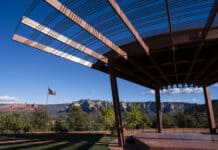On Saturday, Aug. 6, most of the bills passed by the Arizona State Legislature this session went into effect. Of the 388 bills passed into law, Arizona Gov. Doug Ducey signed 374 into law, three of which are particularly noteworthy.
- Senate Bill 1449 criminalizes the use drones that may interfere with law enforcement or emergency scenes, such as flying over a car accident, forest fire or crime scene or so as to protect people from drones that may crash. More problematic is that it also makes it a crime to photograph or loiter near dams, prisons, railroads or other critical sites with the intent to commit another crime. While there are national security concerns, proving “intent” without evidence may be problematic. Additionally, a flat photography ban may also violate the First Amendment, but would require a court ruling to settle the matter.
- Senate Bill 1382 allows business and property owners to remove a disabled person’s service animal from a public place if the animal is out of control or is not housebroken.
The law requires all service animals to be “under the control” of the handler with a harness, leash or tether, unless such a device interferes with the animal’s ability to do its job or the handler’s disability prevents its use.
“Out of control” is fairly vague terminology and could lead to some uncomfortable altercations, but on the flip side, does allow business owners to remove unruly animals that are harassing other patrons. - The biggest impact to Sedona will likely be from Senate Bill 1350, which we have covered in previous stories. The bill prevents cities and counties from banning short-term rentals, negating bans that existed in only a handful of municipalities, such as Sedona.
Homeowners associations can still ban or restrict short-term vacation rentals through provisions in their bylaws.
The law establishes tax rules, but because those lodging taxes are paid to the state and not municipalities, would be hard for cities to enforce, relying on the goodwill of owners to pay what they owe.
The law allows companies like HomeAway, VRBO and Airbnb to operate as businesses in residential areas. While this in itself is not a bad thing — it’s not much different than having house guests next door for a week or two — it does run the risk of changing the demographics of Sedona.
Some homeowners may decide it’s better to run a vacation rental at high rates rather than lease units to long-term renters, reducing the number of residential rental properties in Sedona. This could push residents to move to other areas of the Verde Valley, draining the city of families and seniors who rent. Many may decide working in their home communities is more cost-effective than driving into Sedona daily, which would cut deeply into the Sedona workforce, which is already suffering a shortage of qualified workers.



















